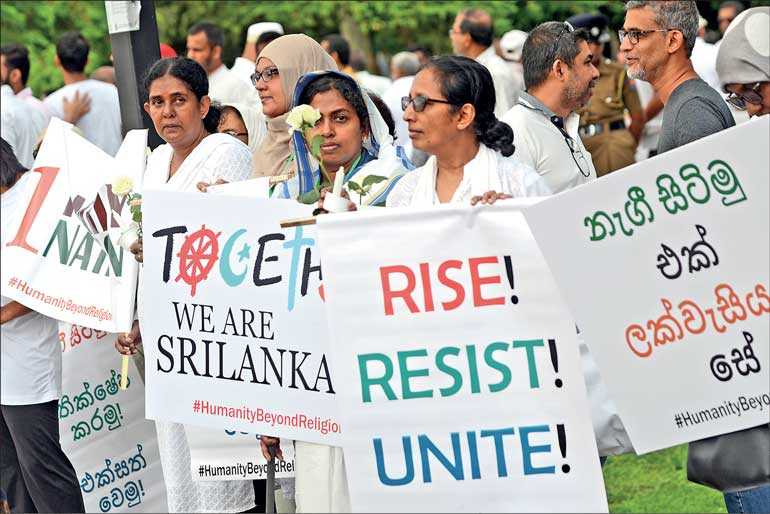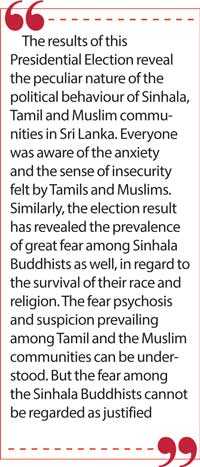Thursday Feb 19, 2026
Thursday Feb 19, 2026
Friday, 29 November 2019 00:00 - - {{hitsCtrl.values.hits}}

Evidently the Tamils in the north and particularly the Muslims in the east have voted en-block for Sajith Premadasa while a vast majority of Sinhala Buddhist voters in the south voted for Gotabaya Rajapaksa. This Presidential Election clearly shows a pattern of voting where major ethnic groups – Sinhala, Tamil  and Muslim had cliqued into three separate groups according to their race and religion, in casting the vote.
and Muslim had cliqued into three separate groups according to their race and religion, in casting the vote.
Another highlight of the Presidential Election is the unprecedented role played by the majority Sinhala Buddhist population to defeat the combined effort of Tamils and Muslims in making Sajith Premadasa the winner and ensuring the victory of Gotabaya Rajapaksa who is also a Sinhala Buddhist.
Moreover, the results of this Presidential Election reveal the peculiar nature of the political behaviour of Sinhala, Tamil and Muslim communities in Sri Lanka. Everyone was aware of the anxiety and the sense of insecurity felt by Tamils and Muslims. Similarly, the election result has revealed the prevalence of great fear among Sinhala Buddhists as well, in regard to the survival of their race and religion.
The fear psychosis and suspicion prevailing among Tamil and the Muslim communities can be understood. But the fear among the Sinhala Buddhists cannot be regarded as justified. Ten years have elapsed since the LTTE was crushed and still there has been various speculation of the LTTE attempting to resurrect itself, but most of these suspicions and speculations did not have a real basis.
Undoubtedly, the terrorist attacks made by a group of Islamist terrorists on Easter Sunday terrorised the entire population of the country irrespective of any difference. However, the situation following the attack had been brought under control and the entire movement made completely dysfunctional.
There were no serious incidents that would have disrupted the security situation during the Presidential Election. All candidates were able to carry out their election campaign in any part of the country including the North and the Eastern Provinces without any fear of life. It may be due to the fact that there was no real issue with regard to the security and the safety of the country, which even the new President was aware, that he soon after being elected the President adopted a policy of limiting the number of security vehicles in the Presidential motorcade to two and stopped the practice of routes being completely blockaded from the general public when he travels.
Group behaviour
In a democratic political system, any social group has the right to act collectively in elections for the benefit of the group they belong to. In this Presidential Election, Tamils in the north have voted for a Sinhala Buddhist candidate and not a Tamil candidate who advocated a separatist program. Similarly, the Muslims too have voted for Sajith Premadasa, a Sinhala Buddhist candidate and not for a Muslim candidate advocating a separatist program.
There is no possibility for a Tamil or a Muslim candidate to contest and win a Presidential Election in Sri Lanka. All they can do is to vote for a candidate from among the Sinhala candidates whom they perceive as having a favourable attitude towards them and their problems. How could it be treated as a condemnable act which is against the law or democratic values?
It was Venerable Maduluwawe Sobitha Thero, who was regarded as an eminent bhikkhu, a prominent leader among Sinhala Buddhists, who brought to the fore the idea of defeating the Rajapaksa regime by employing a common candidate at the Presidential Election in 2015. His political program did not come under the protest and the hostility of the Buddhist monks. In that Presidential Election, Tamil and Muslim votes constituted a decisive factor in the defeat of Rajapaksa. Even at the Presidential Election 2015, Tamils and Muslims voted for the common candidate and not for a separatist program agreed upon but for the intention of dawning of a peaceful and flexible rule.
Though the Yahapalana regime can be considered ineffective and foolish, there was no sacrifice of war heroes to the electric chair or reforms being introduced to promote separatism, as alleged by the Opposition parties, during its tenure of rule. Except for maintaining a relaxed regime that did not deliberately persecute Tamils and Muslims, the Yahapalana regime didn’t even fulfil the transitional justice that it had assured the international community.
The facts being such, even in the Presidential Election 2019, these two ethnic groups, Tamils and Muslims, voted for Sajith Premadasa instead of voting for Gotabaya Rajapaksa, not because Sajith Premadasa had assured them that he would resolve their problems or had a secret agreement with them to do so. Their sole intention would have been for the purpose of creating a relaxed regime that would recognise their dignity as citizens and as human beings without unduly hurting them.
Terrorism
Terrorism being an important factor influencing the attitudes of the public, it is important that we consider whether anyone of the ethnic groups in Sri Lanka can be viewed and branded as a terrorist group.
Terrorist movements in Sri Lanka can be considered to have originated in association with all three communities – Sinhala, Tamil and Muslim. It is only the upcountry plantation community that had remained neutral in this respect.
Two uprisings of Sinhalese youths broke out in the South of Sri Lanka. The youth uprising of ’71 can be considered as one that had been defeated in a very short time. But, the second JVP rebellion which broke out 16 years later managed to hold on for nearly 27 months and it was defeated when the rebels were almost about to seize the power.
Both insurrections had a connection to the temple and the temples served as a safe place for the insurgents to hide their weapons. Nearly 500 Bhikkhus were arrested in the ’71 insurrection, and the number of Buddhist monks killed in the second uprising can be more than 500. The insurgents also killed the rival monks. Just because a small number of Buddhist monks were involved in the JVP insurrections in the south, the Buddha Sasana cannot be considered a terrorist institution. Similarly Sinhala society too cannot be regarded as a terrorist community just because there were two insurrections initiated and launched by Sinhala youth.
Following the ban of the 1987 May Day rally of the JVP which can be considered the origin of the second JVP insurrection, the JVP had it held at the precincts of the Abayaramaya temple at Narahenpita which became the political headquarters of President Mahinda Rajapaksa after his defeat at the Presidential Election 2015.
Venerable Maduluwawe Sobitha Thero and Murutthettuwe Ananda Thero were the two main political speakers who addressed the gathering of that proscribed May Day rally of the JVP. Leslie Ananda Lal, an employee of the Ceylon Petroleum Corporation and Kithsirimevan Ranawaka, a student of the Jayewardenepura University were killed in a shooting incident that occurred at that rally. It is interesting to note that these two Buddhist monks were not considered terrorists merely because of the support they extended to the JVP on that occasion.
Language extremism
The issue of language extremism applies to the Tamil people of Sri Lanka as well. The story of the Tamils in Sri Lanka can be considered as one of the most tragic episodes. It was the power-hungry Sinhala rulers who pushed the Tamil political parties to think of a Tamil Eelam. Although independence was gained in 1948, all Government affairs were conducted in English. Even a telegram received by both Sinhala and Tamil speaking people was in English. A Sinhala or Tamil villager who did not know English had to seek the assistance of an English-speaking gentleman to have it deciphered.
The need for restoring the proper recognition of vernaculars, both Sinhala and Tamil, which had been ignored during the long period of colonial rule and also conducting Government affairs in Sinhala and Tamil languages, was being discussed since independence. Until 1956, the accepted view of all political parties was that the Sinhala and Tamil languages should be given official language status.
The revolt of language extremism that demanded the granting of official status only for Sinhalese language instead of granting both languages, Sinhala and Tamil, the official status came up during the period immediately preceding the political change in ’56. S.W.R.D. Bandaranaike can be regarded as the leader who sparked the embers of the fire wave of language extremism. He promised to make Sinhala the official language within 24 hours if he came to power. With that the policy of ‘Sinhala Only’ became a huge wildfire. Not only the SLFP, but also the UNP was compelled to change the language policy that they had maintained till then and accept the Sinhala Only policy.
Despite the presence of two Tamil political parties, the SLFP and UNP also had a fair representation of Tamil community in their party membership. There were Tamil representatives in the Central Executive Committees of both parties. However, with the adoption of the Sinhala Only policy, the Tamil representatives of Central Executive Committees of both SLFP and the UNP left them; eventually both parties became devoid of Tamil representation.
Pushing against the wall
If at least Bandaranaike who came to power in 1956 promising to make Sinhala the official language had adopted a conciliatory policy that would have allowed the Tamil people living in the north and the east to work with the Government in Tamil language, not only the story of Sri Lanka but also that of the Tamil people would have been much different from what is now.
Tamil is one of the oldest languages in the world and the bond that the Tamils in Sri Lanka have with the Tamil language is much stronger than the bond the Sinhala people have for their language. The Tamils have rendered relatively a subordinate place to their religious concerns compared to their language. The Tamil language, they consider is the main factor that strengthens the ethnic cohesion of their community.
One day I was travelling with a transport agent who was distributing the Ravaya newspaper in his vehicle. He told me a strange story. He was a Sinhalese who lived in Batticaloa for a long time, until Black July 1983. He was the transport agent for Tamil newspapers in Batticaloa area. Although there was a practice and a possibility of throwing the newspaper bundle into the shops during the night, this practice was not possible in Tamil areas. It was necessary that the shopkeeper is woken up and the newspaper bundle is handed over to him. Throwing the paper bundle into the shop he said is considered a serious affront and insult done to the language.
They regarded the policy of ignoring Tamil language as a total loss of their dignity and self-respect. The amount of peaceful effort they had taken to secure that right and the collective strength unleashed for it is enormous. They entered into an agreement with Bandaranaike in this respect. However, Bandaranaike was compelled to tear it into pieces due to the pressure exerted on him by extremist Sinhala language jingoists who were against it.
Consequently, the Sinhala language was made the official language, throughout the country effective from 1 January. The Federal Party launched an ongoing Satyagraha campaign against this move which completely disrupted Government operations in the north and east. They made the following four main demands to stop the Satyagraha campaign which continued for 50 days.
(1) Tamil shall be made the administrative language of the Northern and Eastern Provinces.
(2) Tamil shall be the language of the Court in the two provinces.
(3) A fair solution should be given for the problems faced by Tamil Government servants under the Sinhala Language Law.
(4) Clarification of the language rights of Tamils living outside the north and east.
Pushing for Eelam
The above four demands they put forward at the time cannot be said to contain even a shadow of separatism. Instead of solving this simple problem, what the Government of Sirima Bandaranaike did was to impose Emergency Law, sent the armed forces into the north and east and arrest all Federal Party Members of Parliament and the Senate including the Central Committee members of the Federal Party and detain them in the Panagoda Army Camp for 170 days.
This policy adopted by Sri Lanka in regard to the language issue can be considered a backward policy that has had disastrous consequences not only for the Tamil people but also for the Sinhalese people as well. There are four official languages in Singapore. There are 11 languages in North Africa. There are four official languages in Switzerland. The population that speaks Romansh language in Switzerland is about 1%. Since 1939, that language too has been made an official language.
The Sinhala Only policy in Sri Lanka (and the standardisation policy adopted in the universities in enlisting students that adversely affected the Tamil students) pushed the Tamils into an Eelam struggle whilst at the same time ruining the ability of Sinhala youth to progress by making them a monolingual generation.
The extremist policies of the Sinhalese rulers eventually led Tamil leaders to accept the Eelam concept, resulting in an enormous harm being done to the Tamil people and the country. That was why a destructive and extremist movement like the LTTE was able to raise its ugly head. We must not forget that the LTTE was not hostile and destructive only to the Sinhalese community. The number of Tamils killed by the LTTE was very high – 99% of the Tamil leaders killed were by the LTTE and not by the security forces.
The destruction caused to Tamil society by the LTTE is immense. A policy of looking at all Tamil people with suspicion without adopting a sympathetic view on them will not augur well for the common good of the country except for exacerbating the wretchedness of the country.
The same can be said of the Muslim community of the country. The terrorism that broke out on Easter Sunday can be considered only as a violent and destructive action by a small group of misguided Islamist extremists and not as a phenomenon that occurred under the patronage of the majority Muslim population.
First and foremost, the reconciliation of the fragmented nation and rebuilding the modern nation can be considered as the most pressing issues that Sri Lanka has to resolve before addressing any other issues. Nothing that is done for the progress of the country can be successful without solving this fundamental problem. There is no clear answer to that question in the transformation of 2019. Obviously the other candidates too, who contested the Presidential Election, did not have a clear answer to that question.